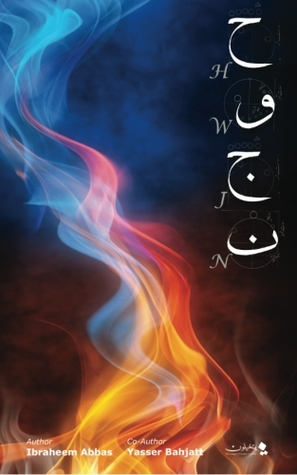December 5, 2013
Saudi Kingdom bans the Arabic equivalent of Twilight
by Dustin Kurtz

You can’t blame them for banning it. Just look at how smutty that smoke is.
The fantasy novel HWJN has been pulled from bookstores in Saudi Arabia this month—not for its hot, wet jinni romance, but rather for its mentions of Ouija boards and other spiritualist paraphernalia.
As reported by M Lynx Qualey on the already-essential Arablit blog, the book—a bestseller in Saudi Arabia with a vocal fanbase online—has been ordered pulled from bookstores. Qualey writes,
No one wants to answer questions officially, although it was apparently last Tuesday — such is the date on the letter — that Saudi’s Hayaa (the committee for the Prevention of Vice and Promotion of Virtue) delivered a handwritten letter to bookstores, informing them that they had to stop selling copies of HWJN.
This is, it should be noted, something of a haphazard ban: the book has not been pulled from all stores and is still more broadly available in the English edition. The book’s authors Ibraheem Abbas and Yasser Bahjatt released a statement on twitter, and a rallying cry around the book has gone out, triggering a healthy case of the Streisand Effect.
The book is narrated by a young jinn who falls in love with a human woman whose family moves into the house they occupy. The conceit of the book is that jinn have an entire contemporary society in parallel to the human world. If this sounds familiar, that may be because you’ve read any major bestselling fantasy book of the past thirty years.
I haven’t finished the book yet myself, but presumably our genie gets his girl, at which point I can only imagine some vigorous lamp rubbing ensues, then the girl gets pregnant, and then the strange perhaps allegorical sparkly offspring breaks its mothers spine from within the womb before tearing its way free. At least, that’s how we’d do it here in the ever-romantic U.S. of A.
I might be wrong. Readers say that true to its origins, the book is actually quite chaste. The striking part of this ban is that the book does not seem to have been banned for its hot mythical sand demon action—jinns are a common and tolerated folklore, and feature in the Quran—but rather because characters in the book use a Ouija board at some point.
Abbas’ response to this is wonderful. From the blog Muftah:
In one tweet, Abbas explained that his choice to have a Ouija board in the novel was to demonstrate that the device works because of the ideomotor effect (an automatic unconscious muscular movement evoked by thoughts rather than sensory stimulus) and that the board game choice was not meant to advocate witchcraft.
Got that? Not only were they not using the board to sext these hot chiseled ghosts, the novel even debunks the things. It is facile to call one book ban more justified than another, but this one seems pretty unwarranted even by Saudi standards.
I suppose the lesson to authors is this: if your gentle, harmless romance between a jinn and a woman is going to get yanked from bookstores anyhow, you may as well write in the filthy anatomically dubious cross-species hookup scenes. At least that way it’ll be a bestseller here in the West, too.
Dustin Kurtz is the marketing manager of Melville House, and a former bookseller.